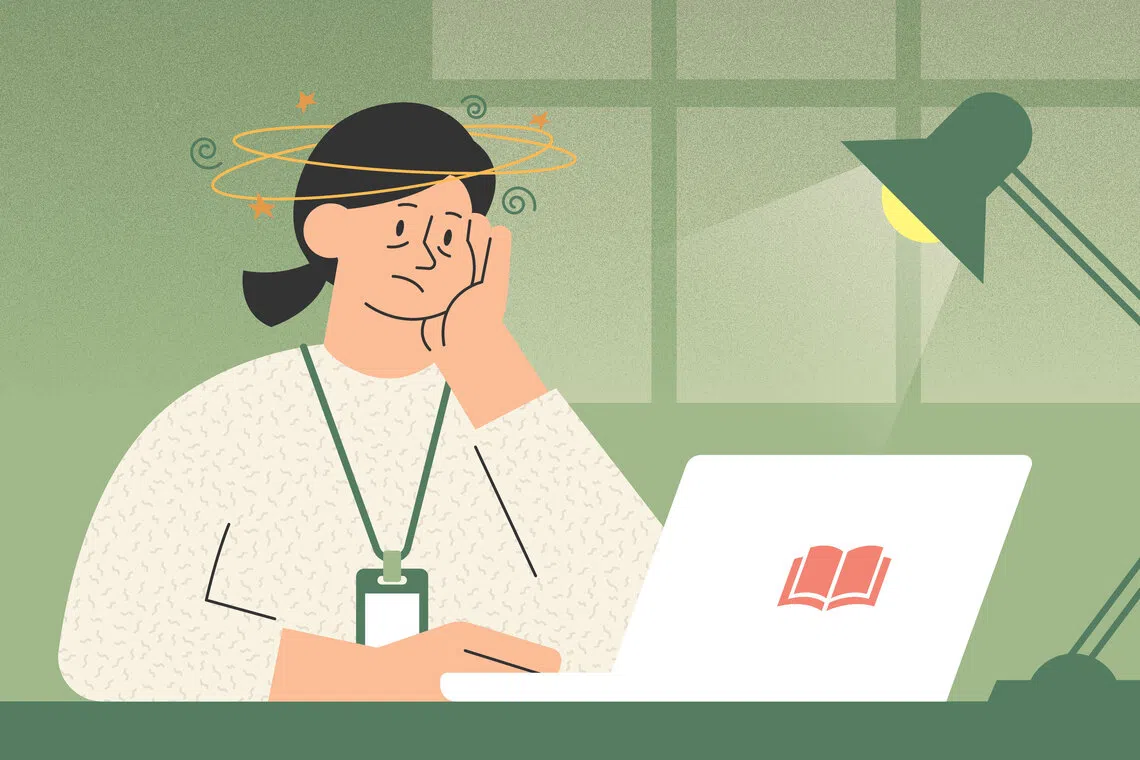askST Jobs: Does youth trump experience?
Sign up now: Get ST's newsletters delivered to your inbox

Mid-career workers can stay ahead by staying curious, seeking out new experiences, and taking time to reflect on what each one teaches them.
ST ILLUSTRATION: LEE YUHUI
In this series, manpower correspondent Tay Hong Yi offers practical answers to candid questions on navigating workplace challenges and getting ahead in your career. Get more tips by signing up to The Straits Times’ Headstart newsletter.
Q: I don’t feel like I can keep up with younger colleagues at work. What can I do?
A: Mid-career workers are no slouches in their capacity to learn, according to Dr Samson Tan, director for learning and professional development at the Institute for Adult Learning.
“Cognitively, adults remain highly capable of learning throughout life. What often changes are the conditions that make learning possible.”
While it is tempting for you to compare your learning pace with that of your younger colleagues, differences often reflect learning habits rather than ability, Dr Tan adds.
“Younger workers have grown up in fast-feedback environments – they are used to searching for information instantly, learning through trial and error, and collaborating in real time.
“They’ve developed the instinct to explore first and refine later.”
In contrast, mid-career workers were largely trained in settings where learning was more structured, Dr Tan says.
“As a result, they tend to approach new tools or ideas more carefully, which can sometimes be mistaken for slower learning.”
Younger workers also tend to be digitally fluent, socially collaborative and more comfortable with ambiguity, Dr Tan says.
“They are used to switching between platforms, adapting to new tools, and learning through communities rather than hierarchies.
“They also tend to view learning as a continuous process woven into daily life, whether through online content, peer sharing, or self-directed exploration, rather than something that occurs only in formal settings.”
However, mid-career workers often stand out for their ability to handle complex, sensitive situations intelligently, a skill that usually develops through practical experience.
“Mid-career workers have had the time and exposure to develop this instinct, often drawing on patterns they’ve seen before.”
Mr David Blasco, country director at Randstad Singapore, says unequal access to training is another factor that may make it seem like younger workers are quicker on the uptake.
He says a recent poll by the human resources services firm found that more than four in 10 younger, Gen Z respondents reported an increase in training opportunities over time, compared with around three in 10 for their Gen X counterparts.
It is also wise to evaluate the significance of your accumulated experience in relation to the type of work you do, allowing you to determine how much effort you need to maintain progress.
Dr Tan says: “Experience adds significant value in sectors where judgment, interpersonal skills and contextual understanding matter, such as healthcare, education, logistics and professional services.
“In these fields, decision-making improves through years of exposure to complex, real-world situations that can’t be easily replicated or automated.”
In contrast, in fast-moving technical domains such as artificial intelligence, data analytics, or green technologies, staying competitive depends more on keeping knowledge current than on years of experience in the field.
“Even so, experienced professionals who can connect disciplines, guide teams and manage complexity continue to hold a distinct advantage,” Dr Tan adds.
Mid-career workers can press home their advantage by taking the right steps.
To start with, learning is most effective when it becomes part of everyday work, Dr Tan says.
Mid-career workers can stay ahead by staying curious, seeking out new experiences and taking time to reflect on what each one teaches them.
More specifically, Dr Tan says: “Setting personal goals for learning each year, such as dedicating time to upskilling or fulfilling continuing professional development hours where relevant, can help maintain consistent momentum compared with an ad-hoc approach.
“Regular exposure to new ideas strengthens confidence and reinforces a growth habit.”
Workers can also learn socially by joining professional communities, sharing ideas and keeping an eye on what others in their field are trying or discovering.
Dr Tan adds: “Taking on short projects, lateral moves, or cross-functional assignments can also reignite their learning momentum and broaden their perspective.”
Remain open to receiving mentorship, even from younger colleagues who can offer fresh insights on emerging tools and trends, he says.
Mr Blasco also encourages mid-career workers to have an open and honest conversation with a team leader or bosses on concerns about falling behind, the skills they wish to develop, the feedback they seek and the growth opportunities available for them.
This proactively demonstrates a mid-career worker’s desire to learn, he says.
“Over time, these conversations with your teams and bosses can help build trust, demonstrate commitment, and create a more supportive environment where your experiences and perspectives are valued,” Mr Blasco says.
Dr Tan also notes that many seasoned professionals underestimate their own value because their expertise has become second nature.
“It’s something they ‘just do’ after years in the role.”
It can be helpful to make one’s knowledge visible, such as by writing down what comes naturally, mentoring a junior colleague, or sharing to others a short example of what your work entails, says Dr Tan.
He adds: “Most importantly, confidence isn’t static. It grows when competence is recognised and expressed.
“Once people find the words to describe what they do well, they often rediscover both pride and purpose in their work.”
Have a question? Send it to askst@sph.com.sg



